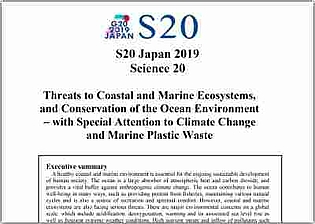News | Wednesday, 6 March 2019
Protecting the oceans: recommendations for the G20 summit

Representatives from the national academies of sciences of the G20 countries handed over recommendations to the Japanese Prime Minister Shinzō Abe today in Tokyo, Japan, for later consultation at this year’s G20 summit. The statement with recommendations for improving marine conservation was jointly drafted by the G20 National Academies of Sciences under the leadership of the Science Council of Japan. The G20 summit will take place on 28 and 29 June in Osaka, Japan.
“Seas and oceans regulate the Earth’s climate, they are diverse and fascinating ecosystems and they are essential for human life. We must work very quickly to take action against the threat posed by increased CO2 emissions, overfertilisation, toxic substances, plastic waste and overfishing,” says climate researcher and member of the Leopoldina Prof. Gerald Haug, Director of the Climate Geochemistry Department and Scientific Member of the Max Planck Institute for Chemistry in Mainz. On behalf of the Leopoldina, he was involved in drafting the recommendations together with marine researcher and microbiologist Prof. Antje Boetius, Director of the Alfred Wegener Institute, Helmholtz Centre for Polar and Marine Research in Bremerhaven, and member of the Leopoldina since 2009.
The summit meeting of the heads of state and government of the 20 most important developed and newly industrialised countries (G20) taking place in Osaka at the end of June is the third to involve scientists through the specially dedicated dialogue forum Science20. The G20 summits began drawing on expert scientific advice in 2017 under Germany’s G20 Presidency. It was then that the G20 National Academies of Sciences produced their first recommendations – for improved global health care provision – under the leadership of the Leopoldina. For more than 10 years now, the G7 summits have also drawn on the expertise of the national academies of sciences.
